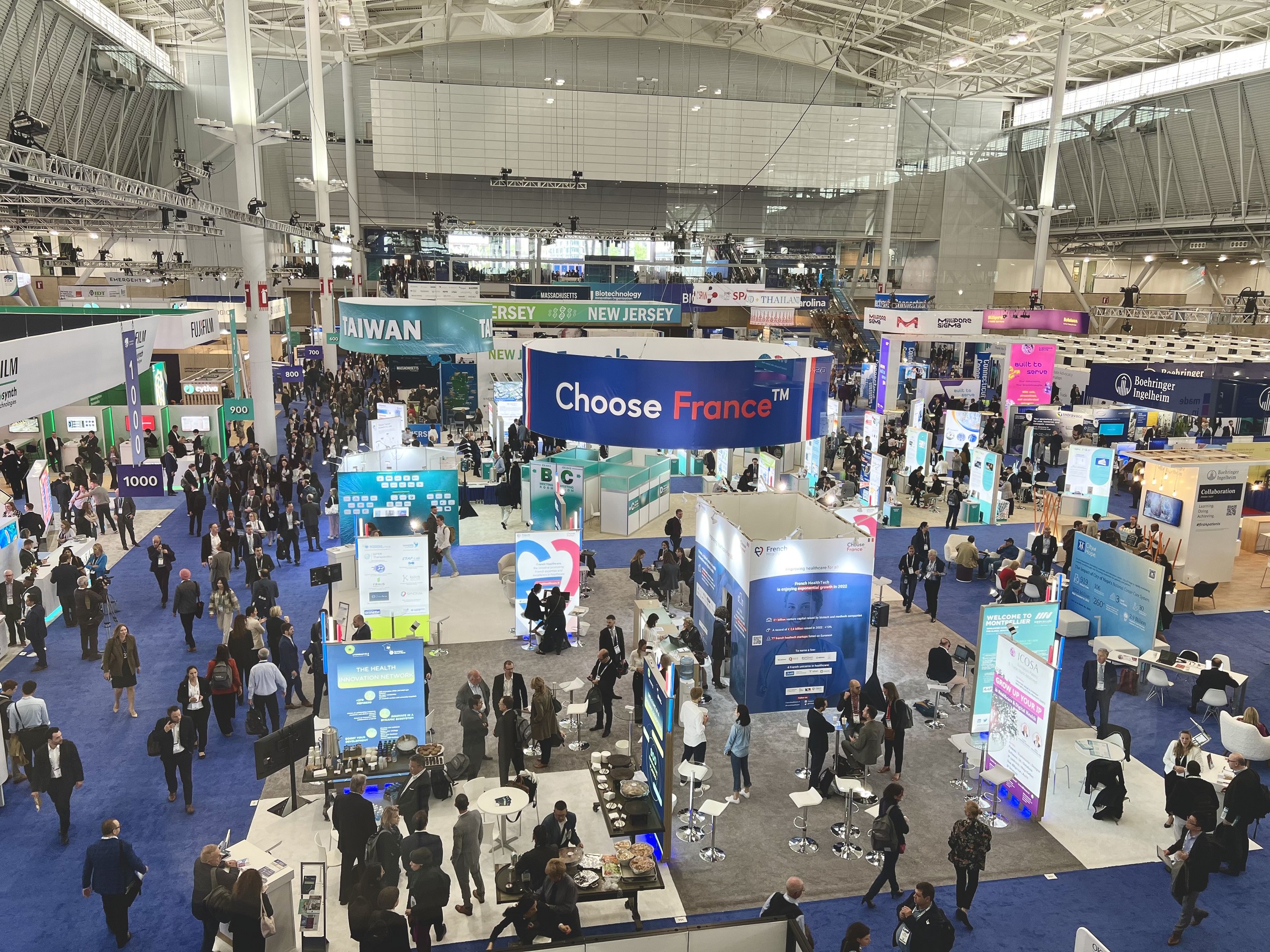“The Prix Galien is the most coveted award by those who devote their lives to developing useful innovations and drugs,” said Bernard Poussot, Director of Roche Holding, and former CEO of Wyeth. In 2022, the nominees for the “Biotech Startup” category include six French companies.
– Aqemia, when quantum mechanics leads to drug discoveries
Established in 2019, it is Aqemia’s aim to disrupt the drug discovery industry. It combines machine learning and unique algorithms inspired by quantum mechanics, to predict the affinity between drug candidates and therapeutic targets. Its two co-founders maintain that their solution is “10,000 times faster than the competition”. Emmanuelle Martiano is an engineer, a graduate of Supélec, and was previously at the Boston Consulting Group. Maximilien Levesque was Research Director at the Laboratory of Theoretical Physical Chemistry at the Ecole Normale Supérieure. As early as 2019, the startup entered into a collaboration with Sanofi, in the area of Covid 19 treatment research. In January 2022, it announced a new partnership agreement with the pharmaceutical group Servier, in the field of immuno-oncology.
– Brenus Pharma prevents resistance to cancer treatment
The company, which was launched in 2014, is based in Lyon and Clermont-Ferrand and has developed a unique, patented allogeneic platform called Stimulated Tumor Cell (STC). Its aim is to generate a first-in-class immune therapy designed to harness the patient’s immune system and thus prevent resistance to cancer treatment. This new generation of cellular immunotherapies could constitute a more effective and cheaper alternative to CAR-T cells. “We offer major innovation in respect of personalization, as our platform is designed to anticipate cancer cell mutations,” Eric Dessertenne, CEO of Brenus, said. “Our targets are therefore both those present on the surface of the cell at time T, but also any mutations that may appear in future. (…) CAR-T Cells have more limited targeting of a receptor on the cancer cell, as well as a development and manufacturing process that is more complicated and costly.”
Its most successful product, STC1010, targets metastatic colorectal cancer, with an MA planned for 2027/2028. It will enter into phase I/II in early 2023 in France, followed by Belgium and the USA.
– CTIBIOTECH is developing human skins in 3D
CTIBiotech has created a worldwide first, CTISkin™ – immunized human skin produced using 3D bioprinting. Since 2009, the Lyon-based company has focused on the 3D assembly of human cells to create predictive models for use in medical, pharmaceutical and cosmetic research. Tissue from patients undergoing cancer surgery is harvested for scientific research, with their consent. All of the skin cells are separated and sorted. Using laboratory cultures, tens of billions of skin cells are obtained from a one-centimeter square sample containing for example one million of each cell type. CTIBiotech then uses 3D bioprinting to produce complete skin models, with the possibility of adding other cell types, including immune cells, to the new skin segment. “This 3D printing technology increases the number of therapeutic approaches that can be tested for burn victims, for example,” said Dr. Nico Forraz. In November 2021, alongside the Institut de Recherche Biomédicale des Armées (French Armed Forces Biomedical Research Institute), the École Polytechnique and the Institut Pasteur, CTIBiotech launched the first consortium in the world dedicated to the technology of cold plasma to treat serious burn victims and heal skin grafts, thanks to the 3D skin provided by the young biotech company.
In September 2022, it also announced a partnership with Gattefossé, to assess any changes to the local environment of a 3D skin model integrating sebocytes, by means of bioimpedance and connected tools.
– Diaccurate lifts the veil on the complex mechanism of action of HIV
Diaccurate is developing “sole-in-class” drug candidates in oncology and immunotherapy. Based in Paris and launched in 2012, the company was established by Truffle Capital with Professor Jacques Thèze. It explores new audacious therapeutic approaches to the treatment of incurable illnesses (pancreatic cancers, stomach cancers, triple-negative breast tumors, aggressive blood cancers, brain metastases, HIV,…). The biotech company is developing three exclusive drug candidates with novel mechanisms of action, including the first targeted chemotherapy (DIAC2010) and the first CD4 immunotherapy (DIAC1010). Its scientific advisory board is chaired by Professor Tasuku Honjo, winner of the Nobel Prize for Medicine in 2018.
In March 2020, the Paris-based biotech company published the results of a study carried out over six years in the Journal of Clinical Investigations, that reveals the reason why the immune system of an HIV patient declines. It funded the study itself (€7 to €8 million) but with the support of prestigious partners – the Institut Pasteur (that granted it an exclusive worldwide license for its original patent), the CNRS, INSERM, the universities of Madrid and Seville, and the Scripps Research Institute. “A small fragment of the virus places itself on the surface of the CD4 lymphocytes that become vulnerable to a digestive enzyme (PLA2G1B), then die and disappear,” said Professor Jacques Thèze, Co-founder and CEO of Diaccurate. The company is developing a monoclonal antibody, Plazumab, that could neutralize the enzyme in action. For the time being, the focus is on the oncology indication. A study applied to pancreatic cancer is expected to start in the next 18 months.
– Genoscience and its unique small molecules in oncology
This is the first clinical stage company ever with unique lysosomotropic agents assessed in a global clinical trial. The company was founded in 2001 by Professor Philippe Halfon, a world-renowned medical expert on viral diseases, especially on Human Immunodeficient Virus (HIV) and Hepatitis C Virus (HCV).
The company was initially focused on the development of anti-HCV agents. Two protease inhibitors were thus developed and out-licensed to BioLineRX.
A new scientific direction was taken in 2012 after the discovery of a new chemical family – autophagy inhibitors. Following promising preliminary in vitro and in vivo results from these small molecules, including against cancer stem cells, Genoscience Pharma decided to devote itself to oncology.
At the end of 2021, Genfit acquired the exclusive rights to develop and market the experimental treatment GNS561 (PPT-1 inhibitor blocking clinical phase autophagy) in cholangiocarcinoma in the USA, Canada and Europe, including the UK and Switzerland. Pre-clinical studies and a Phase 1b clinical trial have confirmed the rationale for targeting the treatment of cholangiocarcinoma, a rare liver malignancy with high mortality and limited treatment options.
– Smart Immune strengthens the immune system to fight cancer and infections
Created in 2017 at the Institut Imagine of the Necker-Enfants Malades (AP-HP) hospital, in Paris, Smart Immune is a clinical-stage biotechnology company developing ProTcell, a thymus-empowered cell therapy platform to fully and rapidly re-arm the immune system. The startup addresses in particular the post-transplant phase, in the case of illnesses that affect blood cells, congenital immunodeficiencies or leukemias for example.
Of the 200,000 patients in the US and Europe that require allogeneic bone marrow transplant annually, only 25,000 patients have access to the procedure. By imitating cell differentiation ex vivo, for the first time in human medicine, Smart Immune will introduce allogeneic T-cell progenitors in the patient, that will then develop into a complete immune repertoire.
In October 2022, Smart Immune and the Hôpitaux Universitaires du Grand Paris (AP-HP) started a phase I/II trial with SMART102, an injection of cord blood-derived human T-lymphoid progenitor cells using the ProTcell platform, in adults with blood cancers.
In December 2021, the startup also announced a research collaboration with the Memorial Sloan Kettering Cancer Center (MSK), in New-York. The aim of this collaboration is to expand its ProTcell pipeline with the new generation CAR-ProTcell platform.







